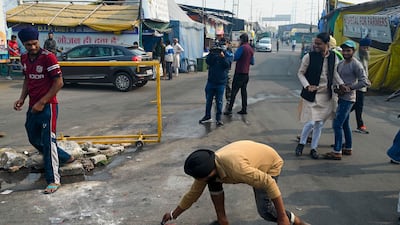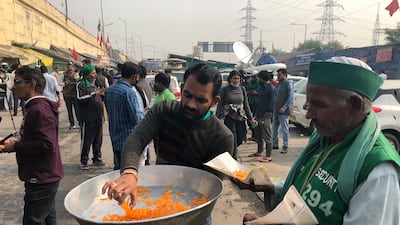Indian Prime Minister Narendra Modi’s government on Wednesday approved a bill to roll back three contentious farm laws that have triggered the country's longest street protests by farmers.
The union cabinet, the supreme decision-making body in India - headed by Mr Modi - met in New Delhi to pass the draft bill that will be tabled in parliament next week as the government moves to annul the farm laws.
The approval follows Mr Modi's surprise public assurance on Friday that the contentious legislation will be recalled. He said the government had failed to convince some farmers about its benefits.
The laws, currently in abeyance following a Supreme Court order, deal with the sale of produce in the free market, contract farming and deregulating food commodities from government control.
But farmers, mainly from Punjab and Haryana, the "breadbaskets" of India, launched stiff resistance to the proposed new rules, calling them "black laws" amid fears that they would benefit big businesses and leave small farmers at their mercy.
Millions of farmers have launched a rolling year-long protest, blocking three major highways approaching the capital New Delhi since last November. Protests in many areas have continued, even after violent police crackdowns.
“We fulfilled the formalities and worked on the process within five days of the announcement by the prime minister,” India's Information and Broadcasting Minister Anurag Thakur told reporters.
"In the upcoming winter session, it will be our priority,” Mr Thakur said. The parliamentary session starts on November 29.
Mr Modi’s ruling Bharatiya Janata Party had vigorously pushed the bills last September, saying they were "historic" and the "biggest reforms" in the agriculture sector.
Mr Modi last week appealed to the farmers to return to their homes after his government backed down but farmer unions have warned that the protests will continue until legislation guarantees minimum prices.
The minimum support price (MSP) — helps farmers to sell their produce above the benchmark rates fixed by the government.
Farming unions have also called for a march to parliament on November 29, when the new bill is likely to be tabled.







